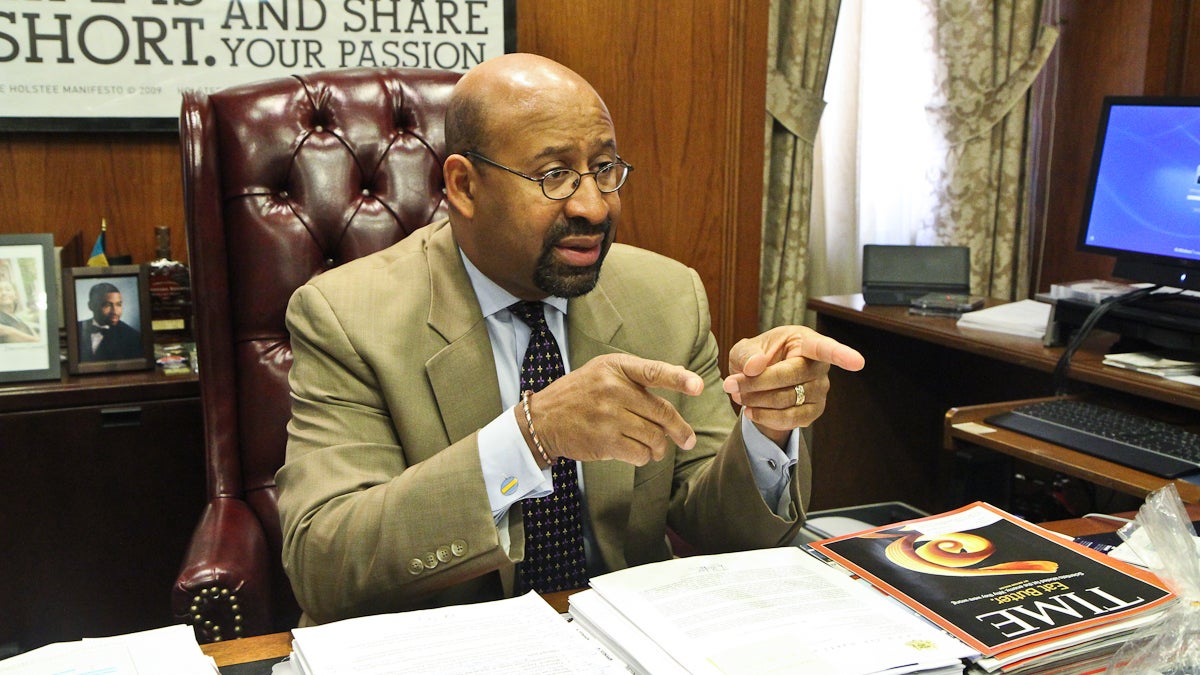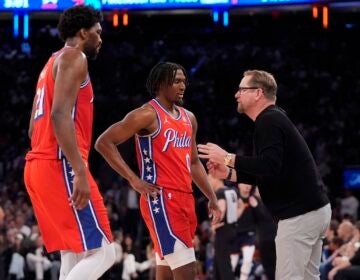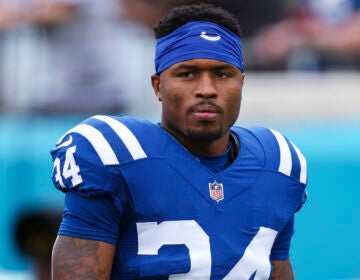Been There, Do This: Mayor Michael Nutter shares lessons learned for his successor
Listen
Mayor Michael Nutter says he'll spend much of his remaining time in office focused on the issues of education and violence. (Kimberly Paynter/WHYY)
As part of our 2015 Philadelphia mayoral-primary coverage, NinetyNine will speak with City Hall’s former second-floor denizens about leadership, challenges facing the city and, among other topics, how best to move Philly into the future.
The first stop on our former-mayoral tour was W. Wilson Goode Sr.’s office, where the city’s first African American mayor touched on an array of topics.
Our second guest won’t be a former mayor until January, but Michael Nutter knows quite a bit about what his immediate successor will face.
While he didn’t mention any of the candidates by name — time constraints meant we didn’t get to the “break down the current field” question, to be fair — Nutter discussed his vision of leadership, challenges faced since his 2008 inauguration, things gleaned from observing previous leaders, the impact of the mayor’s office “Bug” discovery on his career path, school-funding woes, legacy touchstones and what he expects from the city’s 99th mayor.
Excerpts of NinetyNine’s discussion with Nutter will air on Thursday’s NewsWorks Tonight and Friday’s Morning Edition. A full transcript of the hour-long interview is available via this link.
Q&A
NinetyNine: How did your time growing up, and while Fourth District City Councilman, prepare you for the rigors of being mayor?
Michael Nutter: Politics, government was not the family business. No one in my family was involved, but I paid a lot of attention to government, and to mayors, and the things that were going on.
From Frank Rizzo to Mayor Green to Mayor Goode to Mayor Rendell to Mayor Street. I ran for City Council in 1987 and lost. I had worked on Ed Rendell’s governor’s race in ’86. He lost. Everybody ran again in ’91 and we all came in together.
I paid a lot of attention to the things that Ed Rendell would do in his administration. We had an economic crisis at that time. Not an national/international crisis, it was just Philadelphia-based crisis. There were a lot of lessons learned from that time that we did subsquently end up using during the larger international crisis.
Understanding the inter-relationship — as we all learn about in third, fourth, fifth grade — of the three branches of government, I wanted to better understand how all of that worked. I’ve always had a bit of a strategy interest. I like to understand how do things work. What is this all about? You learn in school about the judiciary, the legislative and the executive branch, but what is it really all about? How do you run a government, which, in essence, is a big business?
I also paid attention because, in many instances, the things that they did affected what I could do as a legislator. If you don’t have any money as a city government, it’s hard to implement some of the things that you want to do.
Mayor Rendell, David L. Cohen and a ton of folks and, certainly at the time, Council President John Street, we worked — as the city administration and city council — on trying to resolve and fix many of the early 90s financial challenges that the city faced.
There were a lot of lessons learned from that time that we did end up using during the larger international crisis. We announced, I think it was in 2009, that we were suspending all payments to our vendors to conserve cash.
99: When was it that you started to envision yourself sitting in this mayoral chair?
MN: I’d say in a more serious way — just thinking about it, not necessarily doing anything about it — the early 2000s, and I think the most concrete time came in 2003 with the ?em I can only call it explosive event of “The Bug” incident in the mayor’s office.
That was, in my view, in recent times, probably one of the most singularly embarrassing moments for our city government, for our public employees and for our citizens. …
I’ve read virtually every indictment that came out of that whole sordid incident. It read like a novel. Like it could be a movie.
[I thought] this is insane and we have to fix this. This is Philadelphia. This is the birthplace of freedom, liberty and democracy. We’re a serious, big city and it was just so offensive in nature.
So, all of that was just such a big mess that I then did much more seriously start thinking about it. …
I think the bug incident and the subsequent indictments, arrests, the people going to jail and the like crystallized more for me that you need to start thinking about this much more seriously and you need to start thinking about your own future.
The issue of integrity in government, and the credibility of government and transparency and citizens having confidence that the people who work here, who they entrust with their hard-earned tax dollars are doing things in a way that is appropriate, that is not embarrassing, that is respectful to them as citizens of this city. …
The facts are every mayor who has run for re-election has been re-elected so it’s really kind of an eight-year term. I said to myself [in 2006], I’m going to be 49, 50; if I am really interested in running for mayor and don’t do it now, it’ll be eight years later and I’ll be 58, 59, whatever the case may be. And that’s not old. Sixty, I heard, is the new 40, but it’s 58, 59, and this is a younger person’s kind of job.
99: Talk about the challenges of the economic meltdown.
MN: This was like Great Depression times, and you know, in a very, very different world. President Franklin Delano Roosevelt didn’t have to deal with a 24/7 cable-news cycle. Didn’t have to deal with Twitter. Facebook. Cell phones. People have a lot of different ways to get information and communicating. A lot has changed in the 80-some years since the Great Depression.
This is an international economic meltdown; the mayor can’t really do anything about that, but you’re the mayor, so that’s the way it goes.
99: How did you get people to buy in to your raise-taxes reduced-services approach to the recession, or didn’t you?
MN: Folks knew that it wasn’t [happening only to] us but everything is local. Taxes are going up. Services are going down. All sorts of things are going down. Public employees didn’t have contracts for a long period of time. All of that is added on top of it.
That’s what leadership is about. We had a plan. We had a vision. We had a focus. And, what I tell new mayors all the time is: Make a plan. Work the plan. Stick to the plan. Constant communication. … Part of leadership is also about keeping the team energized and focused.
99: What about this job do possible successors and voters need to know?
MN: In this job, you will find yourself greeting the President at the airport when Air Force One comes to the city. You’ll meet ambassadors, consul generals, presidents of countries, depending on their travel or your travel. You’ll be at the White House. You’ll be in meetings with the President or cabinet secretaries.
So, one of the things I say to folks is think about many of the things that have happened in our city. Good and unfortunately bad. Positive or not so positive.
As you think about the next mayor, if you have someone that you are favoring at this time, you have to think about them in the context of doing this job.
Unfortunately, some citizen will get shot or killed. A police officer may get shot or killed. A firefighter may die in a fire. A young gentleman over in fleet management fell off a ladder, hit his head and died. A young gentleman at PGW killed in a gas explosion. Car wrecks. Trucks overturned. Water mains break. All sorts of things happen. Buildings fall down. Fires. The mayor directly and indirectly sometimes is involved and very much aware of all those issues.
You make big announcements, whether it’s our international bike race, Mummers parade, Fourth of July, World Meeting of Families, Made in America, all kind of things. And you also go out that door and make some very somber announcements as well.
The next mayor will find him- or herself in the Roosevelt Room which is the room directly across from the Oval Office in the White House with 13, 14 other mayors from across the country, more than likely seated directly across from the president of the United States of America and you’ll be informed that the President is going to ask, the third question is coming to you about whatever it is.
Then, you’ll leave there and go to the stake out area, right outside the White House there, a little driveway, and there will be 10 national cameras and 15 microphones. And you’ll get asked a question. So you want to think about whoever it is you’re thinking about as the next mayor, think about them in that context. That’s the job.
Think about them for all the decisions that have to get made that you will never read about in a newspaper or see on TV or hear about on the radio. What kind of people are around that mayor to help them make those decisions, to help the mayor — from time to time — change his or her mind when maybe they want to do something or don’t want to do something. Because I actually don’t get to do all the things I want to do and, many days, I do things that I don’t want to do but that my teams thinks are important for the city moving forward.
99: Let’s talk about the mayoral challenges as they pertain to public education in Philadelphia.
MN: The next mayor has to ratchet up even higher on the priority list the issue of talking about education on a regular basis. Regular, as in every day.
They’ll have to spend time in Harrisburg with legislators and the governor, because I think 2015 must be the year that we actually develop and properly fund a student-weighted funding formula and then do you inspire young people and parents and teachers and principals and other partners in this work to maintain a focus on kids and their education.
If we educate young people at the earliest possible age, with violence prevention components, you’ll actually drive down the crime rate. You’ll increase your economic base because more companies will want to be here.
The questions that I get now, as compared to six, seven years ago when it was a tremendous focus on crime — and it’s not like people don’t care anymore; we’ve made some gains, but we still have some work to do — but the No. 1 question I get from CEOs, and chairs of companies today that are thinking about expanding or coming into Philadelphia is not about taxes is “What kind of progress are we going to make on educating kids?” That really is the issue and that has to be the focus.
The next mayor has to be ready to dedicate a lot of his or her time to the issue of education. It’s not only funding. It’s accountability. It’s about providing support. The mayor may not be directly in charge of schools but certainly has the responsibility to support kids and the superintendent and the folks at the SRC for the many tough decisions that they have to make as well.
99: Beyond the libraries, what if any regrets do you have, whether that’s something you weren’t able to accomplish or how you handled something?
MN: People have asked me from time to time “what did you not do” because of the recession. The answer is we pretty much did all the things we wanted to. What the recession did was slow down how quickly we could do them.
We’ve had a significant reduction in homicides. I want it lower.
And, I think at this point, the number one issue that still troubles me during my time —- even though, as I’ve laid out, we’ve had some success in the area of putting additional funding into educating our children — is getting all of us to the point where we would have a student-weighted funding formula.
That remains to be seen in terms of what actually happens in the course of this year.
My focus has primarily been around safety and education. There’ve been so many great, great successes but I think those two things are inextricably tied to each other and if we’re about to have success on the one — which is education — we’ll almost automatically have success on the other. But, we still have a lot of work to do, and that’s how I’m going to spend my time.
WHYY is your source for fact-based, in-depth journalism and information. As a nonprofit organization, we rely on financial support from readers like you. Please give today.




